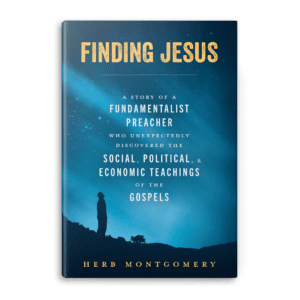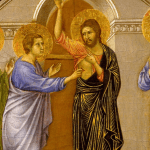
As we continue our discussion on the resurrection and listening to those on the margins, John’s story of Mary speaks to those who were being marginalized at the time of its writing.
Welcome Readers! Please subscribe to Social Jesus Here.
(Read this series from the beginning at Part 1 and Part 2.)
John, the book this week’s reading is from, was written when the Jesus movement, heavily influenced by the surrounding culture and social structures of certain communities, had been taken over by patriarchists. The early egalitarianism of the house churches was being pushed out by those who favored the more patriarchal structures of the surrounding civic organizations (see In Memory of Her: A Feminist Reconstruction of Christian Origins by Elisabeth Schüssler Fiorenza). Interpretations and arguments that did not previously exist in the Jesus movement begin being seen in the early church. One famous example is the statement in 1 Timothy 2:11-14:
“A woman should learn in quietness and full submission. I do not permit a woman to teach or to assume authority over a man; she must be quiet. For Adam was formed first, then Eve. And Adam was not the one deceived; it was the woman who was deceived and became a sinner.”
This was a time when communities that recognized the apostleship of Peter and other male disciples began to be in conflict with communities that recognized the apostleship of Mary Magdalene and other women like Priscilla in the early church. The era of the patristic fathers was about to begin.
So it is interesting that in this same era, the gospel of John gives us this week’s story. Jesus could have showed up to either of the two male disciples referenced in the story, but instead he chooses to appear first to Mary. As has been often said, when she tells the other believers what she has heard and experienced, Mary becomes an apostle to the apostles. Patriarchists taught that woman, symbolized by Eve, was the first human to be deceived, but in John’s gospel, woman is the first human to believe in the risen Jesus. Mary is the new Eve.
This makes sense in terms of our journey so far through the gospel of John in the lectionary. The Johannine community had many Gnostic leanings. In later Gnostic communities, a person’s sex was a material matter, not spiritual. It was part of the concrete realm of their physical bodies. What mattered to these dualistic, binary communities was a person’s soul or spirit, regardless of whether their spirits lived in a physical body that was male or female. So these communities were much more egalitarian in practice than more orthodox, patriarchal Christian communities.
Though I reject the Gnostics’ belittling of our bodies and the concrete world, especially considering our dire need to reverse climate change and the very real, material injustices that some communities fight to survive and thrive in spite of every day, I appreciate the egalitarian practices that these early beliefs led to. I reject the Gnostic basis for those practices (i.e. the belief that the material world doesn’t matter), yet we, as contemporary Jesus followers, can still learn from some of those practices given the injustices women still face in our society today.
This week’s reading shows me a Jesus who choose to reveal himself first to Mary. Not to Peter, nor to John. It reminds me of the importance, especially in our current social context, of listening to women when they speak their truth. This Easter, let’s focus on the life-giving good news of love, justice, and their power to overcome, reverse, and undo the death-dealing things in our world. Let’s begin, like Jesus, with prioritizing the voices of women sharing the truth. Then, let’s not stop there! Let’s prioritize all the voices that our systems and practices push to the margins and undersides of our society.
Change begins from the margins of our society inward, from the grassroots up. And in our reading this week, change begins in an empty tomb after a Roman cross, with a woman named Mary daring to hope again, and a Jesus mistaken for a gardener, planting in the hearts of his early followers the seeds of his vision for a world that is a safe, compassionate and just home for everyone.
What is this story of Mary and Jesus saying to you this week?
 Herb’s new book, Finding Jesus: A story of a fundamentalist preacher who unexpectedly discovered the social, political, and economic teachings of the Gospels, is now available at Renewed Heart Ministries.
Herb’s new book, Finding Jesus: A story of a fundamentalist preacher who unexpectedly discovered the social, political, and economic teachings of the Gospels, is now available at Renewed Heart Ministries.














